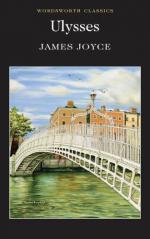the fruit of their lawful embraces. He is older
now (you and I may whisper it) and a trifle stooped
in the shoulders yet in the whirligig of years a grave
dignity has come to the conscientious second accountant
of the Ulster bank, College Green branch. O Doady,
loved one of old, faithful lifemate now, it may never
be again, that faroff time of the roses! With
the old shake of her pretty head she recalls those
days. God! How beautiful now across the
mist of years! But their children are grouped
in her imagination about the bedside, hers and his,
Charley, Mary Alice, Frederick Albert (if he had lived),
Mamy, Budgy (Victoria Frances), Tom, Violet Constance
Louisa, darling little Bobsy (called after our famous
hero of the South African war, lord Bobs of Waterford
and Candahar) and now this last pledge of their union,
a Purefoy if ever there was one, with the true Purefoy
nose. Young hopeful will be christened Mortimer
Edward after the influential third cousin of Mr Purefoy
in the Treasury Remembrancer’s office, Dublin
Castle. And so time wags on: but father
Cronion has dealt lightly here. No, let no sigh
break from that bosom, dear gentle Mina. And
Doady, knock the ashes from your pipe, the seasoned
briar you still fancy when the curfew rings for you
(may it be the distant day!) and dout the light whereby
you read in the Sacred Book for the oil too has run
low, and so with a tranquil heart to bed, to rest.
He knows and will call in His own good time. You
too have fought the good fight and played loyally
your man’s part. Sir, to you my hand.
Well done, thou good and faithful servant!
There are sins or (let us call them as the world calls
them) evil memories which are hidden away by man in
the darkest places of the heart but they abide there
and wait. He may suffer their memory to grow dim,
let them be as though they had not been and all but
persuade himself that they were not or at least were
otherwise. Yet a chance word will call them forth
suddenly and they will rise up to confront him in the
most various circumstances, a vision or a dream, or
while timbrel and harp soothe his senses or amid the
cool silver tranquility of the evening or at the feast,
at midnight, when he is now filled with wine.
Not to insult over him will the vision come as over
one that lies under her wrath, not for vengeance to
cut him off from the living but shrouded in the piteous
vesture of the past, silent, remote, reproachful.
The stranger still regarded on the face before him
a slow recession of that false calm there, imposed,
as it seemed, by habit or some studied trick, upon
words so embittered as to accuse in their speaker an
unhealthiness, a Flair, for the cruder things
of life. A scene disengages itself in the observer’s
memory, evoked, it would seem, by a word of so natural
a homeliness as if those days were really present there
(as some thought) with their immediate pleasures.
A shaven space of lawn one soft May evening, the wellremembered




